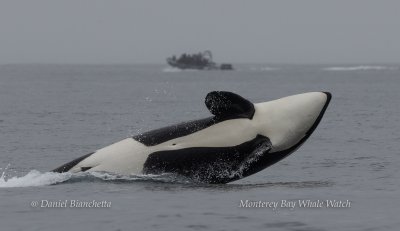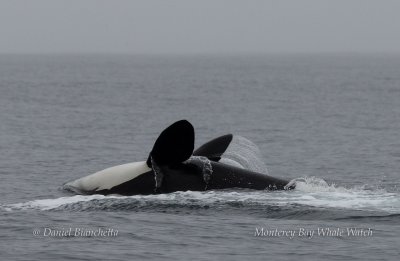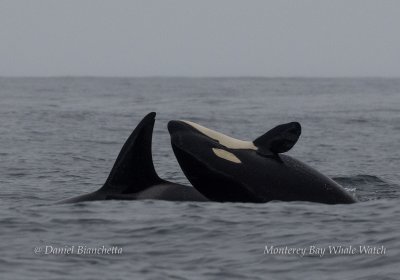A large group of humpback whales have been spotted charging at orcas who were trying to hunt in Monterey Bay, California.
Monterey Bay Whale Watch said on a Facebook post that vessels recently saw five orcas, or killer whales, with 20 humpback whales surrounding them, and at least 11 of the humpbacks began charging at the orcas.
Whale-watching boats had been observing younger orcas practicing hunting techniques when the humpback whales approached them, the Facebook post said. As the humpback whales closed in on the orcas, they were "almost on top" of them. This caused the whales to start "breaching, tail throwing, and pec slapping."
Colleen Talty, a research biologist at Monterey Bay Whale Watch, told Newsweek that the vessels "often see humpback whales interacting with killer whales in this area." She said, "It has been seen in other areas of the world as well. They usually interfere when they are actively hunting but will also interfere when the killer whales are feeding on a carcass."

Orcas are known to feast on nearly every species of whale. They have even been observed taking down blue whales, the largest animal on earth. But according to Talty, this is not often seen in Monterey Bay.
"The humpback whales were not trying to protect themselves, as killer whales will not hunt them in the Monterey Bay area," Talty said. "The killer whales have been absolutely incredible lately. All our crew and scientists have been absolutely amazed and in awe with seeing killer whales and other whales up close."




This is not the only interaction between the two species recorded recently. Orcas were filmed terrorizing a pair of humpback whales off the Washington coast. Witnesses told the Pacific Whale Watch Association the encounter lasted for nearly three hours. In that time, the whales continue to breach the surface of the water and emitted loud vocalizations.
Josh McInnes, a marine ecologist and killer whale researcher at the University of British Columbia's Institute for the Oceans and Fisheries Marine Mammal Research Unit, told Newsweek that Monterey Bay is the main research area for studying these interactions.
"As a species, killer whales are known to prey on almost every known marine mammal species. This includes the large whales," McInnes said. "In our main study area of Monterey Bay, California, we see transient killer whales predating gray whale calves and aggressive interactions with humpback whales."
McInnes said the recent interaction taking place near Washington was "very interesting," as this species of orca does not typically target large cetaceans in this area.
"However, the individuals in the video are part of an outer coast subpopulation that frequent offshore waters from California to British Columbia and are known to hunt and interact with large whales," he said. "Overall, I think it is an interesting behavioral interaction that shows two charismatic species with long evolutionary histories of interacting."
Uncommon Knowledge
Newsweek is committed to challenging conventional wisdom and finding connections in the search for common ground.
Newsweek is committed to challenging conventional wisdom and finding connections in the search for common ground.
About the writer
Robyn White is a Newsweek Nature Reporter based in London, UK. Her focus is reporting on wildlife, science and the ... Read more





